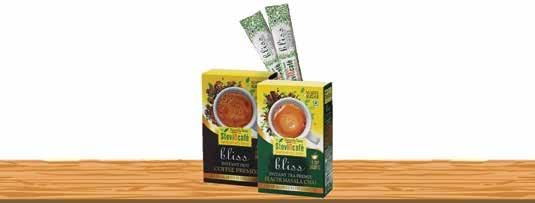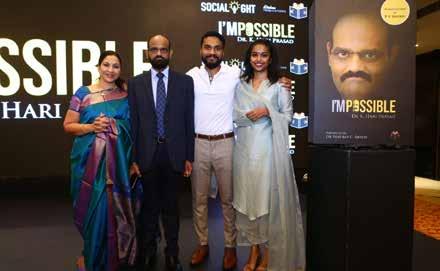
5 minute read
Interview: Against All Odds
AGAINST ALL ODDS
Saga of an aspiring cricketer who mainstreamed Emergency Medicine in India and became one of the best healthcare leaders in the country braving illness, setbacks
Advertisement
From an aspiring cricketer to Anesthesiologist-cum-critical care physician to an Emergency Medicine specialist to finally President of India’s first corporate chain of hospitals, Dr. K Hari Prasad's has been an awe-inspiring journey.
President of the Apollo Group of Hospitals today, Dr. Hari Prasad was instrumental in establishing Emergency Medicine as a specialty in the country. In an exclusive interview granted to Medical Tourism magazine, he opens his mind on a wide variety of topics including the future of Indian medical sector, technological advancements in the field of medicine and the growth plans of the Apollo group.
Q: A lot has been said about the booming healthcare sector in India and how it caters to the needs of the global community. Do you think the Indian market has attained its true potential as a medical tourism destination?
A: Not really… All of us know the medical care facilities in our country are the best in terms of quality and affordability. We have a rich pool of skilled doctors and nurses besides world-class infrastructure facilities. We also have a safe environment and the beautiful landscapes, always an added advantage. However, the medical tourism sector in the country is yet to bloom. This is because of negative publicity often dished out abroad by the media even as our strengths remain unexplored. I personally feel that there is tremendous potential for hosting a higher foreign client base here.
Q: But is the country's technological infrastructure as advanced as that available in the best medical care centres in the developed world?
A: We’ve come a long way technology-wise in the last two decades and the quality of technological infrastructure is at par with any other developed country. Despite this, the treatment cost here is much lower. For instance, we’re now offering world-class proton therapy (used to treat tumors and cancer cells with precision and with very low toxicity). In-fact, the Apollo Proton Cancer Centre is the first such facility in the whole of South Asia. While a similar treatment could cost $ 2 lakh in the US, it costs only one-fourth or less here.
Q: There is a huge demand among foreigners for traditional Ayurvedic treatment, especially on the wellness front. How do you view the trend?
A: Ayurvedic treatment is now in high demand and Kerala is among the most preferred destinations. The big hospitals, including us, are attempting to provide holistic treatment to patients that include Ayurvedic practices too. We have found Ayurvedic treatment to be very effective in ensuring shorter recovery period after a major surgery or radiation treatment. However, we’re careful to offer only those Ayurvedic practices that are proven scientifically.
Q: What are your expansion plans?
A: Right now, we’re focused on starting our operations in Kochi, which will be the 73rd hospital of the Apollo Group. The infrastructure is ready and we had a soft launch on January 31. The over 300-bed multi super specialty hospital, coming up at Adlux premises, Angamaly, will cater to international patients, among others.
We’ve deployed best talents in the field to provide top quality service. Nearly 50 specialists are being deployed now and their strength will go up in the
coming days. The hospital will provide every treatment, except radiation oncology, in the first phase. The second phase will be completed in another six months. We expect a lot of foreign clients from destinations like the Middle-East, thanks to the Kochi International Airport located nearby.
Q: You wanted to be a cricketer during your student days, but ended up being an Anesthesiologist and a successful healthcare entrepreneur...
A: Yes.. In-fact, I was the youngest to represent Andhra Pradesh in the Ranji Trophy at the age of 17. However, unlike today, the game was not popular then. I received no encouragement from any quarter and soon ended up studying in a medical school. From then on it was a new innings.
Q: Looking back, what was the most satisfying moment in your profession?
A: I started my career specializing in Anesthesiology and critical care and later specialised in Emergency Medicine in 1996. At that time, Emergency Medicine as a specialty was not recognised by the Government of India. In most of the hospitals, there were just ‘Casualty’ wings to look after accident victims and emergency cases. Often the patients were being treated by ordinary physicians who had little idea about the related complications. An Emergency physician should be able to handle all emergencies belonging to every specialty and should be able to provide optimal care during the Golden hour (the period following a traumatic injury during which there is a good possibility of preventing death by medical intervention).
We approached Emergency Medicine as a separate specialty and held training programmes with the help of faculty and institutions from advanced countries like the US where it was already a focused medical branch. We adapted their protocols to the specific situation in our country. It gives me immense satisfaction that the initiative prompted the government to look into the issue seriously. The medical council finally recognised the specialty in 2009.
Q: You have faced a lot of challenges in your life and struggled hard to reach where you are...

A: My life was full of ups and downs and, often, it was a roller coaster ride. Every time I made a major achievement, I had to face some setback or the other, including being afflicted with cancer. But I never remained shy of taking up the challenges that came my way and was determined to work my way up. I penned all these experiences in the form of a biography titled 'I'm possible', which was published just a few days back. I am happy to get good reviews for the book and that the book is inspiring many.











